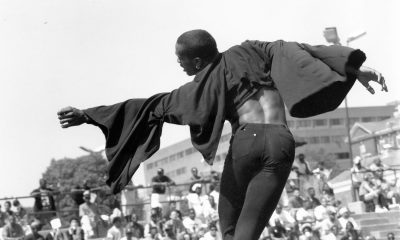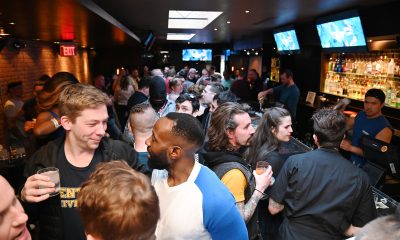a&e features
40 Under 40: Queer women of Washington
Celebrating some of the city’s up-and-coming change agents
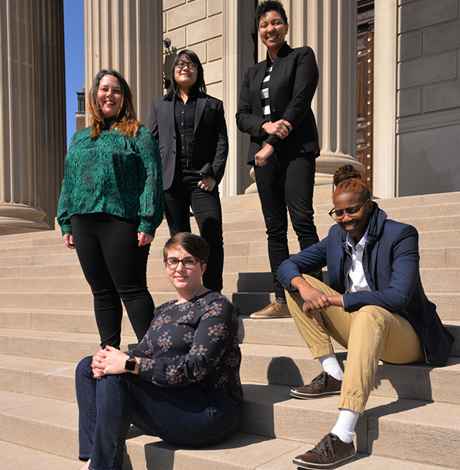
The Washington Blade, in partnership with the Mayor’s Office of LGBTQ Affairs and the Office of Women’s Policies and Initiatives, is proud to present: 40 Queer Women of Washington.
Here we celebrate some of the city’s many inspiring queer women who are the voices of change from a diverse group of industries. Nominations came from our readers; that list was then trimmed to the 40 queer women profiled here. Come meet the 40 Under 40 at a special event on Wednesday, March 27, 6-9 p.m. at the Google office at 25 Massachusetts Avenue. Get tickets online via the Blade’s Facebook page.
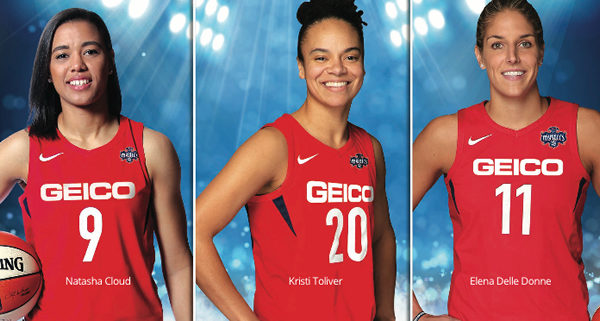
Name: Washington Mystics
Occupation: Professional basketball team WNBA
Passion: Compete at the highest level on the court and bring a WNBA Championship to Washington. We play to excite, inspire and unite the D.C. community — all eight wards. Our passion for the game and this city is reflected in the memory-making experiences we strive to provide to our fans each game day. We invite all to celebrate and share in these moment with us.
What advice would you give to a young woman walking in your shoes? Demonstrating fearless character will lead to your success. Tapping into the power of unified strength that comes with a sisterhood gives you the ability to overcome any challenge or adversity. We are a part of the community we represent and you are a part of us. Celebrate the power and beauty of being a woman.
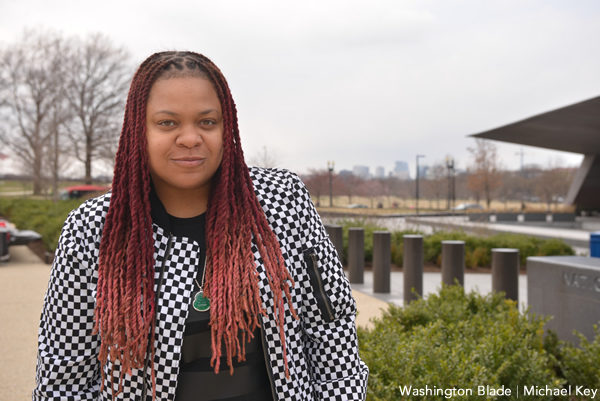
Name: Amina Brown
Occupation: DJ
Passion: Being an entertainer/DJing
What advice would you give to a young woman walking in your shoes? My mother told me I would grow up and have my own business when I was in the fourth grade. I would give young women the same advice that was given to me and it changed the trajectory of my life: “Fall in love with something you enjoy doing and turn it into a business!”
Washington is one of the few major cities in America with a female mayor. What does this mean to you as a queer woman living in the District? I thinks it’s important for women to be represented in the high ranks of corporations and politics. During my speaking engagements at schools, I always encourage our young girls to reach for the stars and never think that gender makes them inadequate in any industry.
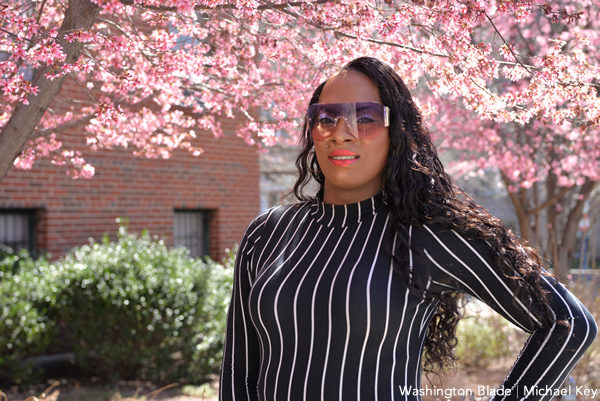
Name: Bela Muney
Occupation: External affairs team
Passion: Helping others in need.
What advice would you give to a young woman walking in your shoes? Never give up on your hopes and dreams. The sky is the limit.
Washington is one of the few major cities in America with a female mayor. What does this mean to you as a queer woman living in the District? It means we’re all here and queer!
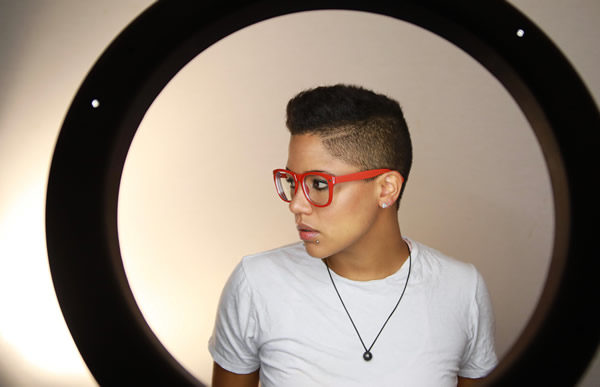
Name: Be Steadwell
Occupation: Musician
Passion: My passion is for telling stories that make queer black folks feel seen and affirmed.
What advice would you give to a young woman walking in your shoes? Someone out there needs to hear your story. Tell it with sincerity, vulnerability and it will change someone’s life.
Washington is one of the few major cities in America with a female mayor. What does this mean to you as a queer woman living in the District? Black women at the center of leadership and politics is exactly what our country and our world needs. I believe the most marginalized communities have the perspective and incentive to look out for all people. Though I don’t agree with everything our mayor does, I’m proud to have her as a leader for our city.

Name: Elizabeth Lindsey
Occupation: Executive director, Byte Back
Passion: Leading an organization that helps people from all backgrounds thrive in the digital economy.
What advice would you give to a young woman walking in your shoes? Be true to who you are. When we’re ourselves, when others see us being authentic and real, there’s nothing we can’t do. There’s such a confidence that comes from using our strengths and doing work that feels natural to us. And if someone — an employer, an investor, a partner — doesn’t want us for who we are, then they’re not the right fit for us.
Washington is one of the few major cities in America with a female mayor. What does this mean to you as a queer woman living in the District? As a queer woman of color, a parent and a leader in the nonprofit sector, I am inspired every day by Mayor Bowser and the other women in D.C. leading our city. It is such a privilege for me to hardly ever be the “only” in D.C. — I’m rarely the only woman, or person of color, or member of the LGBTQ community in a room. And I’m thrilled to raise my daughters in a city like this.
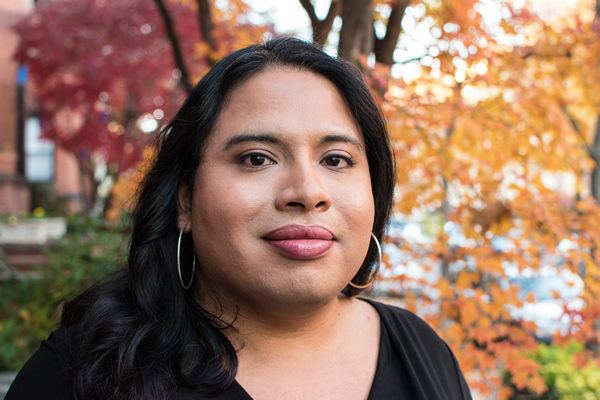
Name: Raffi Freedman-Gurspan
Occupation: Director of external relations, National Center for Transgender Equality
Passion: Social justice and equal opportunity for those who have been most marginalized and historically oppressed including black people, Latinx people, indigenous peoples, women and feminine presenting individuals, LGBTQ folks, people living with disabilities and religious and ethnic minorities in the United States. My passion is to create a better world for all.
What advice would you give to a young woman walking in your shoes? Remember to laugh, remember to have a good cry once in a while and remember to hug those you care for and remind them why they are important to you. Being a strong woman requires knowing yourself, being honest with yourself and asking for the compassionate support you deserve from those whom you love.
Washington is one of the few major cities in America with a female mayor. What does this mean to you as a queer woman living in the District? Having a woman of color mayor as a woman of color myself is tremendously moving, inspirational and something I proudly share with people about our city. Mayor Bowser has been such a great friend of the LGBTQ community and as a queer woman I am proud to live in her city.
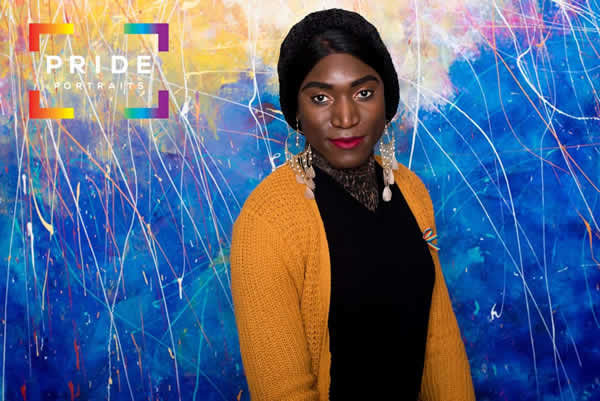
Name: Tiara Gendi
Occupation: Community organizer/trans activist
Passion: Black liberation and protection of LGBTQ+ youth
What advice would you give to a young woman walking in your shoes? In a world that is designed against you, dare to be unapologetically you and do your part.
Washington is one of the few major cities in America with a female mayor. What does this mean to you as a queer woman living in the District? Being a black trans and immigrant woman, having a black woman mayor means there is platform to leverage the safety and meaningful participation of queer women in decision-making processes.
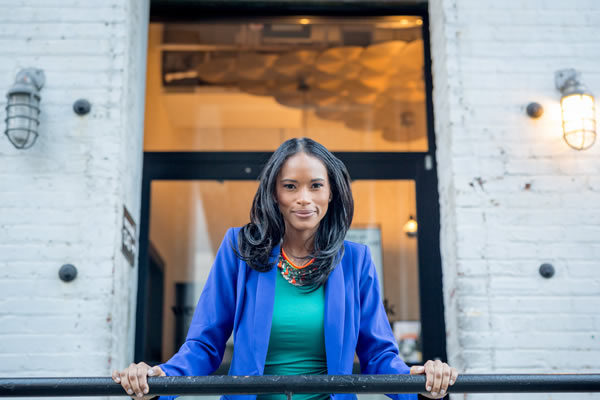
Name: Alesia Lucas
Occupation: National digital manager
Passion: Connecting people
What advice would you give to a young woman walking in your shoes? 1. Always trust your instincts. 2. Have an idea? Don’t wait for someone else to do it. Go for it. 3. Own your “no”; you don’t have to be anywhere or do anything you don’t want to.
Washington is one of the few major cities in America with a female mayor. What does this mean to you as a queer woman living in the District? As a native Washingtonian, having a woman lead our city inspirers me deeply. It shows us what’s possible. They say D.C. is one of the most LGBT-friendly cities in the United States and Mayor Bowser has no doubt contributed to that honor.
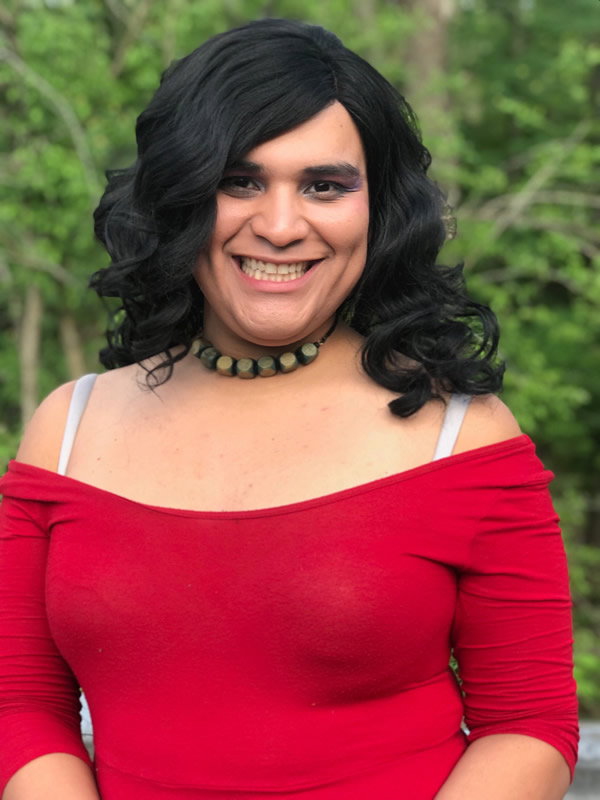
Name: Xemiyulu Manibusan Tapepechul
Occupation: I am an independent artist: a playwright, author, spoken word artist, actor and director.
Passion: I have a passion for healing indigenous transgender, intersex and gender non-conforming communities through the arts.
What advice would you give to a young woman walking in your shoes? It’s OK to not know who you are. It’s OK to discover who you are along your journey. It’s OK to love yourself and celebrate yourself. You got this!
Washington is one of the few major cities in America with a female mayor. What does this mean to you as a queer woman living in the District? It’s important to have representation of cisgender women, transgender women, transgender men, non-binary people and cisgender men of color, in government and other cisgender white male-dominated spaces. As a queer woman living in the capital of the empire, it’s important to see genders that have been in the minority in position of power, that are representing truth, justice and ancestor.
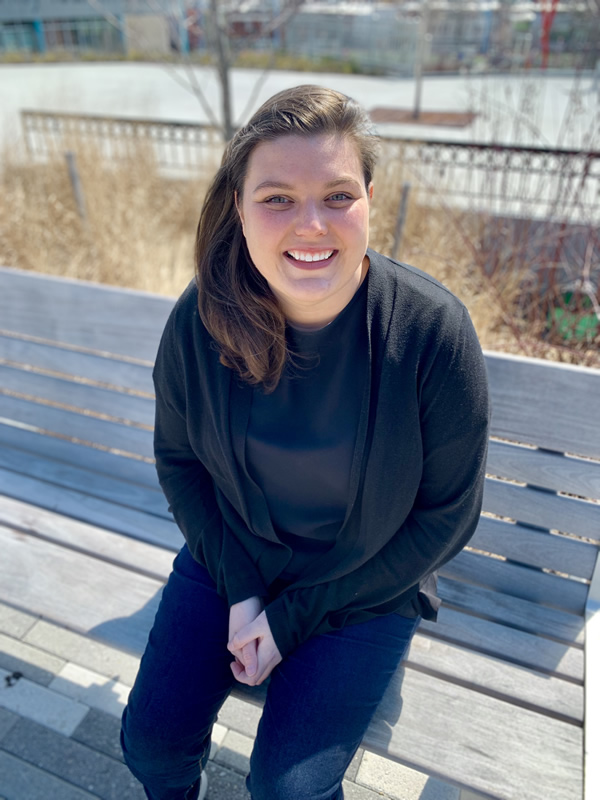
Name: Ashley Trick
Occupation: Community affairs engagement strategist with Capital One
Passion: Serving and elevating diverse communities.
What advice would you give to a young woman walking in your shoes? Actively work to limit the use of “sorry” in your vocabulary, but practice radical candor every day. Women can care personally while also challenging directly.
Washington is one of the few major cities in America with a female mayor. What does this mean to you as a queer woman living in the District? Women’s leadership is imperative. Diversity in leadership breeds innovation and resilience and having a black woman as the mayor of our city sets an important precedent for further leadership. Through women’s innate leadership, they transform, nurture and empower their communities and I am so profoundly proud to work under so many exceptional women.
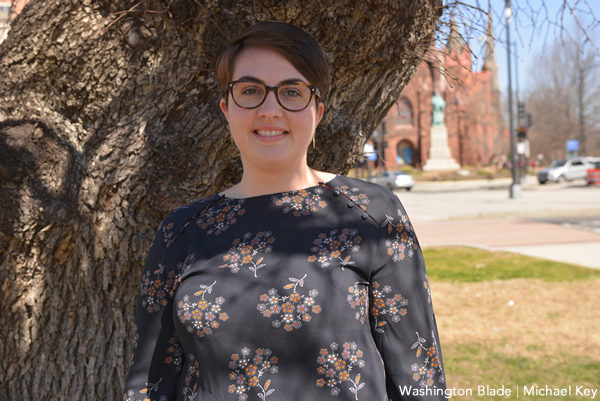
Name: Amanda Dennison
Occupation: Director, programs and partnerships
Passion: I have spent much of my life with my nose in a book, so much so my family feared I wouldn’t know my way around in the real world. I have always been driven by the desire to learn and understand more about the world. Through books I was able to hear other peoples’ stories, learn about communities, my chosen field of work, the world beyond the small town I grew up in. All of those books, and constantly asking “why” or “so what,” have played a big part in shaping my view of the world now and getting to where I am today.
What advice would you give to a young woman walking in your shoes? There are probably three main pieces of advice I would given young women. One: you are worthy and deserve to be here and to be heard. Two: be brave and don’t let the fear of leaving your comfort zone prevent you from chasing your goals and dreams. Three: be unapologetically yourself and take pride in who you are.
Washington is one of the few major cities in America with a female mayor. What does this mean to you as a queer woman living in the District? Seeing Mayor Bowser leading our city and actively supporting the LGBTQ+ community is both empowering and inspiring. As a queer woman living and working in D.C., trying to live my best life and lift up our community, it means everything to have a strong female fighting to give every D.C. resident the opportunity to live their best lives. I know that our mayor supports me, our community and the important work we are trying to accomplish.
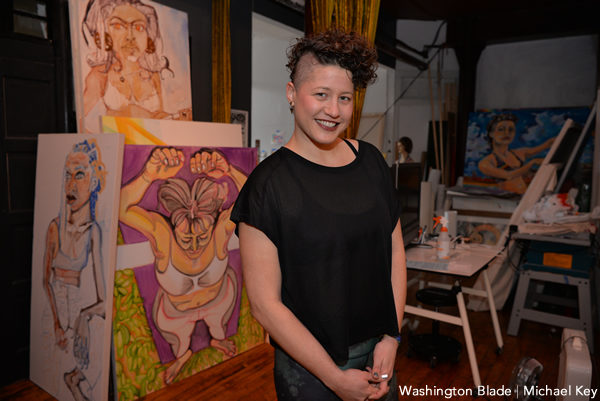
Name: Lisa Marie Thalhammer
Occupation: LOVE artist
Passion: Painting, murals, art and activism.
What advice would you give to a young woman walking in your shoes? Trust your journey, believe in your power and live your dreams in full color.
Washington is one of the few major cities in America with a female mayor. What does this mean to you as a queer woman living in the District? When Mayor Bowser spoke at the Jan 21, 2017 Women’s March on Washington, I felt an immense amount of pride to be a queer Washingtonian woman. I was in the crowd that day with a group carrying my “Strong Women LOVE” artwork, a painting on a 24-foot diameter parachute, which depicts a woman flexing her biceps in front of a rainbow-colored backdrop. I felt synergy with my mayor’s directive to speak up for women and their health care; like I was in that moment for a reason, with a purpose to live out my life’s mission of creating visual art and images that empower and uplift women.
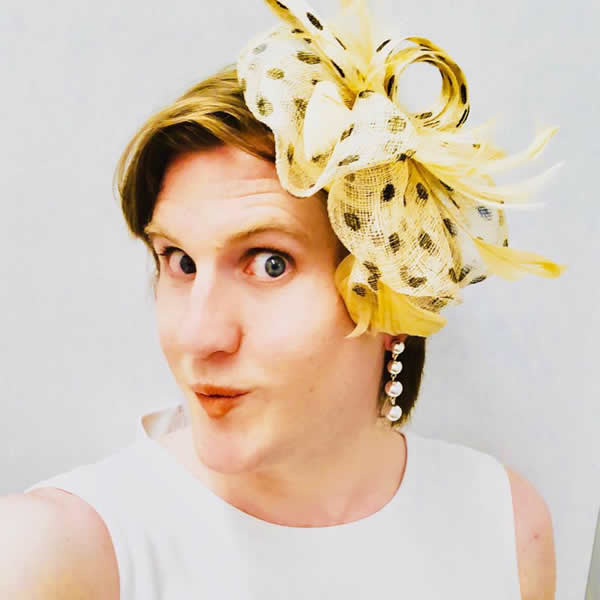
Name: Charlotte Clymer
Occupation: Press secretary for rapid response, Human Rights Campaign
Passion: Justice for marginalized communities, the written word and seeing women present their unapologetic authenticity to the world.
What advice would you give to a young woman walking in your shoes? You are never “not queer enough.” You are never “not woman enough.” The only scarcity that should ever concern you is being yourself. The world doesn’t need a copy. It needs an original. It needs you.
Washington is one of the few major cities in America with a female mayor. What does this mean to you as a queer woman living in the District? Mayor Bowser was one of the first public officials to speak out when I was discriminated against at a D.C. restaurant for being a transgender woman. She is not just my mayor; she is my sister. This is a leader who fights for the queer community.
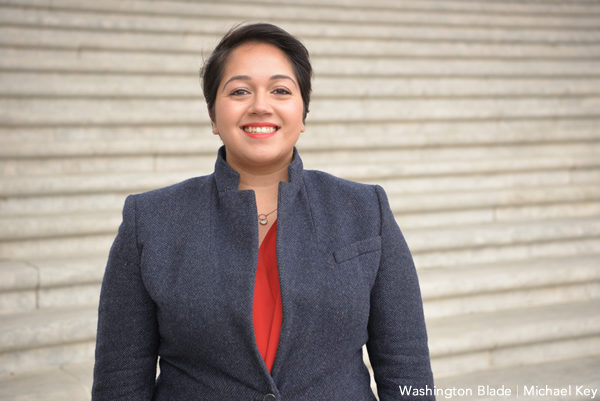
Name: Sharita Gruberg
Occupation: Director, LGBT research and communications project, Center for American Progress
Passion: Making rights a reality.
What advice would you give to a young woman walking in your shoes? No one is ever as confident or certain as they seem. Most of the time we are all just trying our hardest and making it up as we go along. So don’t let doubt stop you!
Washington is one of the few major cities in America with a female mayor. What does this mean to you as a queer woman living in the District? We definitely need more women in every level of public office in this country.
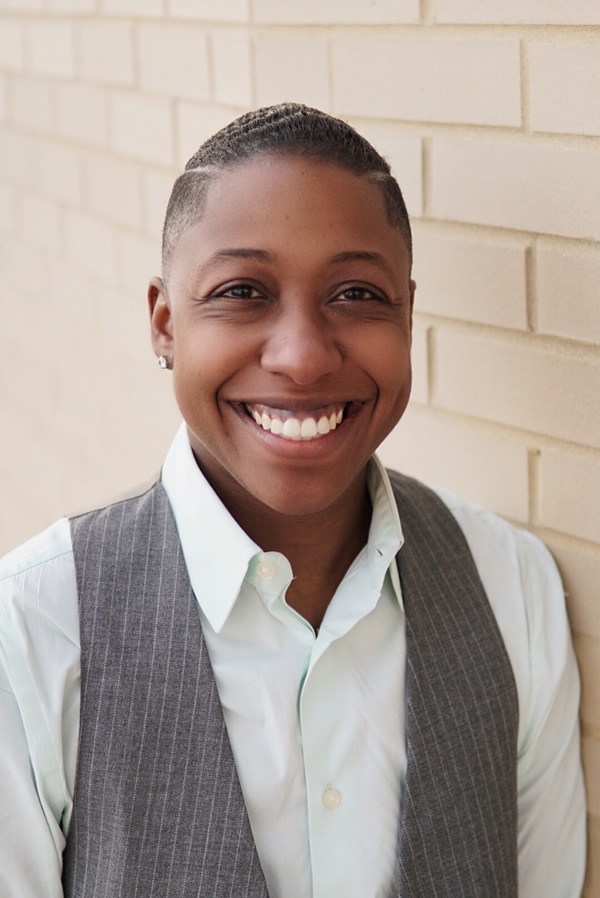
Name: Ebone Bell
Occupation: Founder and editor-in-chief of Tagg Magazine
Passion: Creating events, building community, learning new things and friends and family.
What advice would you give to a young woman walking in your shoes? Keep reaching for the stars! You’re closer than you think.
Washington is one of the few major cities in America with a female mayor. What does this mean to you as a queer woman living in the District? I’m proud to live in a city that continues to be groundbreaking in so many ways. Not only is our mayor leading the charge, but I consistently see LGBTQ women doing the same. D.C. is a beautiful, diverse city.
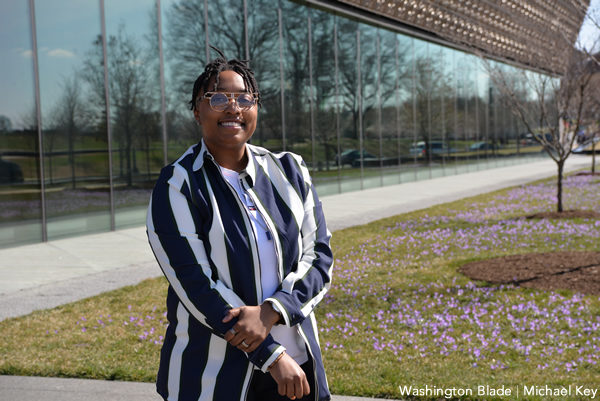
Name: Lanae Spruce
Occupation: Manager of Social Media and Digital Engagement, Smithsonian National Museum of African American History and Culture
Passion: Locating trends on the internet and doing it for the culture. In my free time I am a foodie who loves exploring the local restaurant scene on my travels.
What advice would you give to a young woman walking in your shoes? When you walk into a room, don’t be afraid to be yourself and stand in your own truth. You’ve already made it past the door.
Washington is one of the few major cities in America with a female mayor. What does this mean to you as a queer woman living in the District? I chose to make Washington my home because it has a long history of preserving and championing the rights of queer people. As a queer black woman, it means the world to me that my city has my back.
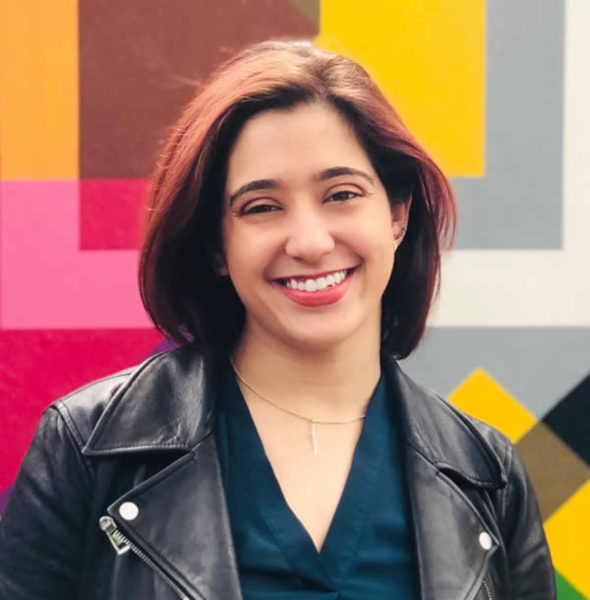
Name: Andrea Pino-Silva
Occupation: Digital strategy and communications manager at The National Center for Lesbian Rights
Passion: I help tell the stories of our queer resistance for a living, and it inspires me every day. I fight for a world where our struggle isn’t our full story and envision a world where every student has access to a safe, equal education free from violence and oppression.
What advice would you give to a young woman walking in your shoes? As a niña, my abuelito always told me: “nunca, nunca, nunca pares de luchar.” He instilled in me a belief, that no matter my upbringing, or how seemingly impossible my goal, it was achievable. Apply to that college. Apply to that job. Write that memoir. Lead that protest. La lucha is in all of us and our resistance and our passion is a gift from our ancestors. Their lucha, and their dreams live on within us.
Washington is one of the few major cities in America with a female mayor. What does this mean to you as a queer woman living in the District? I’ve never lived in any other city led by a woman until moving to D.C., nor have I lived in a city with as many protections for marginalized people. As a queer woman, I feel safer and prouder to live in a city led by a strong woman like Mayor Bowser and feel more confident investing in making this city even better.
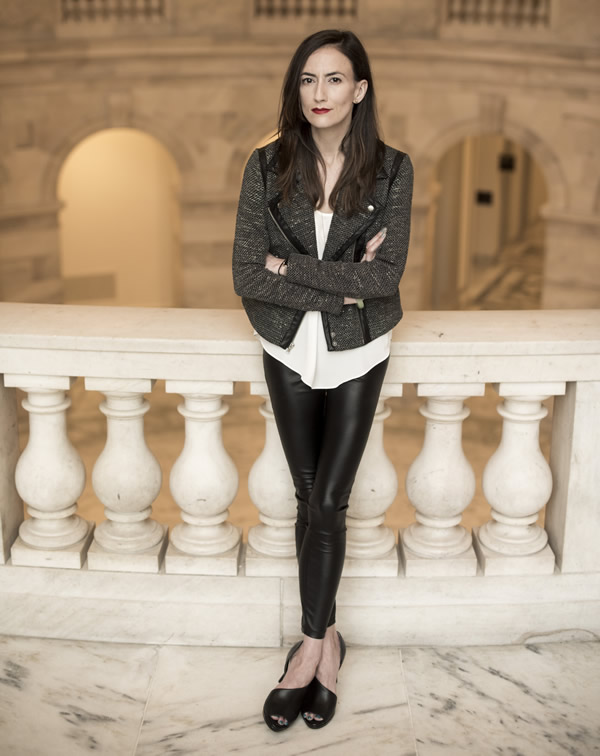
Name: Rebecca Buckwalter-Poza
Occupation: Journalist
Passion: Helping others find their voice.
What advice would you give to a young woman walking in your shoes? Be fearless.
Washington is one of the few major cities in America with a female mayor. What does this mean to you as a queer woman living in the District? It means everything to me, especially as a woman of color. Former Justice Sandra Day O’Connor said, “As women achieve power, the barriers will fall. As society sees what women can do, as women see what women can do, there will be more women out there doing things, and we’ll all be better off for it.”
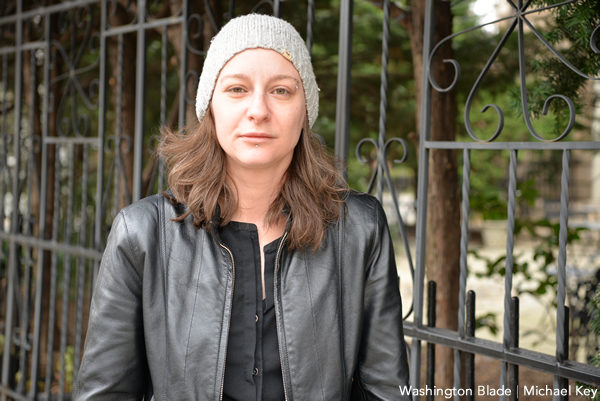
Name: Lina Nicolai
Occupation: Owner
Passion: Little things in life.
What advice would you give to a young woman walking in your shoes? Don’t give up. Work hard.
Washington is one of the few major cities in America with a female mayor. What does this mean to you as a queer woman living in the District? It means that the concerns of women issues are being addressed in policy.
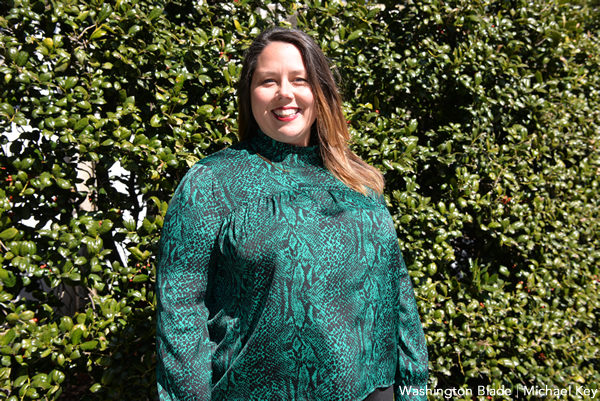
Name: Laura Durso
Occupation: Vice president of the LGBT Research and Communications Project at the Center for American Progress
Passion: Gender equity, fat acceptance, empiricism and music.
What advice would you give to a young woman walking in your shoes? Try new things, care just a little bit less what other people think of you, tell friends you love them, make peace with your body, have confidence in your ability to adapt and change, learn to catch when your brain wants to give in to imposter syndrome and remember how badass you are, spend your time with people and things that nourish your soul, hire people smarter than you, lean on your networks to help you get shit done, believe you can fix things but remember not everything always needs fixing, forge a new path, bring people with you.
Washington is one of the few major cities in America with a female mayor. What does this mean to you as a queer woman living in the District? The ability to govern effectively knows no gender and as a queer woman, I am both proud and comforted to live in a city where voters recognize the talent and leadership that women bring to the table. Electing leaders from diverse backgrounds and experiences opens the door for new conversations to happen and new policies to be enacted that better serve our communities and drive us toward more meaningful change.
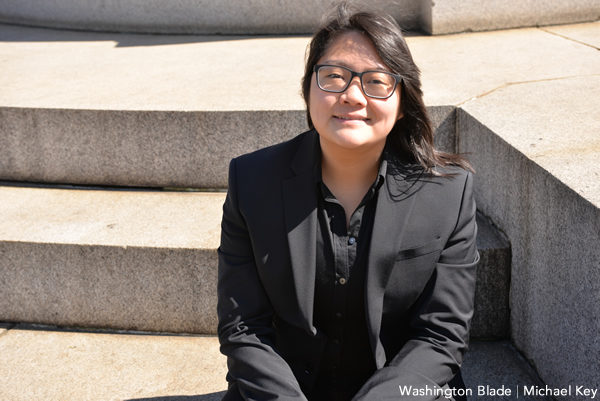
Name: Taissa Morimoto
Occupation: Policy Counsel at the National LGBTQ Task Force
Passion: Playing guitar, crushing the patriarchy, apple juice, the Companion Cube, deconstructing colonialism and long walks on the way to protests.We each have such different life experiences, especially based on our social identities and how we are perceived in our society. I hesitate to give general advice because I can only speak from my own experiences as a queer woman of color who has many privileges. What changed my life, though, was the decision to put my own needs first. And that happened when I moved to D.C., where I was able to be my full self.
What advice would you give to a young woman walking in your shoes? So, for queer women of color in my shoes, I will share what I wish people had told me more often: Don’t ever apologize for who you are and who you are becoming. There are people who will love you for exactly who you are. Let them. Being vulnerable is not weak, it is a sign of growth. Lean into that discomfort. Ask for help, even when you think you can handle it on your own. You are enough. You will always be enough. I am so honored and proud to be in community with you all.
Washington is one of the few major cities in America with a female mayor. What does this mean to you as a queer woman living in the District? It means finally being able to live my full complete self. To me, it means freedom.
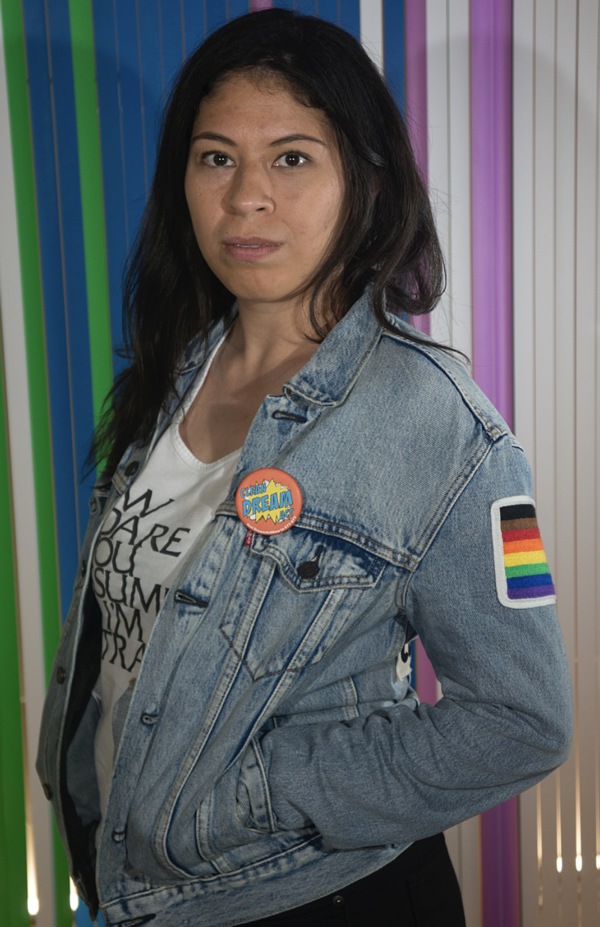
Name: Breanna Diaz
Occupation: Co-director, Pull for Pride
Passion: LGBTQ advocacy via access to typically closed-off spaces, such as powerlifting.
What advice would you give to a young woman walking in your shoes? Remain authentic and accountable to yourself and your community. Always center who you are, your lived experience and your values in your work. Take pride in what you bring to the table.
Washington is one of the few major cities in America with a female mayor. What does this mean to you as a queer woman living in the District? Representation matters and seeing someone of the same gender as myself in a leadership position is empowering.
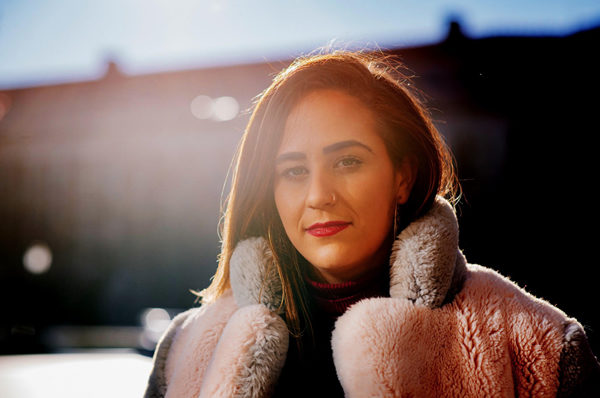
Name: Carlie Steiner
Occupation: Co-owner of Himitsu + Dos Mamis
Passion: Empowering women and making money.
What advice would you give to a young woman walking in your shoes? Buy better shoes with good support.
Washington is one of the few major cities in America with a female mayor. What does this mean to you as a queer woman living in the District? Watching Muriel Bowser break through the glass ceiling by becoming D.C.’s mayor both empowered and inspired me to make the final push to open Himitsu at the age of 25. Now, two-plus years later, she continues to push the boundaries of what is possible. Women serving in positions of leadership and the visibility it provides to young women is paramount. Having a role model like Mayor Bowser who is equally respected and relatable is important to women of all ages, but especially to young girls who can look up to her as an example of a woman is making change and that’s how real progress happens.
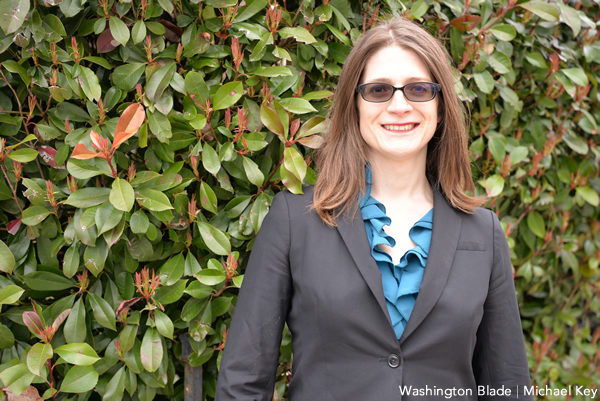
Name: Harper Jean Tobin
Occupation: Lawyer/lobbyist for trans equality
Passion: Improving trans people’s lives and living my own rich life.
What advice would you give to a young woman walking in your shoes? Listen to your passion. Find where you’re best suited to make a difference. Ask for support. Be kind to yourself.
Washington is one of the few major cities in America with a female mayor. What does this mean to you as a queer woman living in the District? We need leaders and public servants who reflect the diversity of our communities today. Women may not necessarily be better leaders, but every conversation is different when the people in the room don’t all look the same.
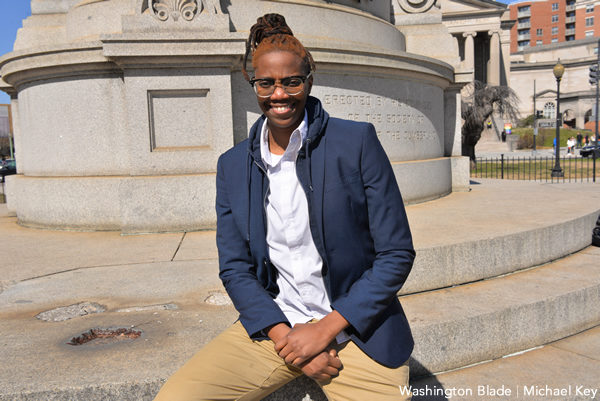
Name: Ashlee Keown
Occupation: Marketing specialist/entrepreneur
Passion: Creating opportunities for people
What advice would you give to a young woman walking in your shoes? Don’t be afraid to try something new and fail. It is also important to adjust your expectations so that you understand that anything that you do will involve growth and failure.
Washington is one of the few major cities in America with a female mayor. What does this mean to you as a queer woman living in the District? It mean we are lucky enough to have someone in office who understands the challenges women and people of color face. Some who has the insight and ability to think about others.
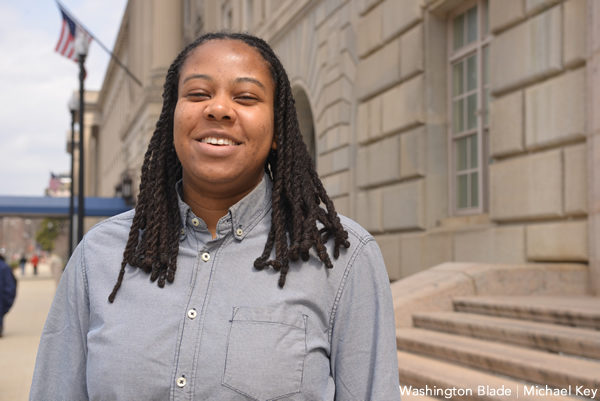
Name: Kyrisha Deschamps
Occupation: Festival producer/operations manager
Passion: Using my skills, experience and access to create opportunities and help others. Also, intentionally finding joy in each day.
What advice would you give to a young woman walking in your shoes? Surround yourself with positive people who support your wild dreams and act as your sounding board. Trust the process and take time for yourself when you need to.
Washington is one of the few major cities in America with a female mayor. What does this mean to you as a queer woman living in the District? I’m a huge fan of women in positions of power. I am very excited about the number of women who are moving into politics to create the change that needs to be seen and felt in the world. As of today, a political career isn’t in the stars for me, but I would love to see more women and LBGTQ leaders in positions of power in government.
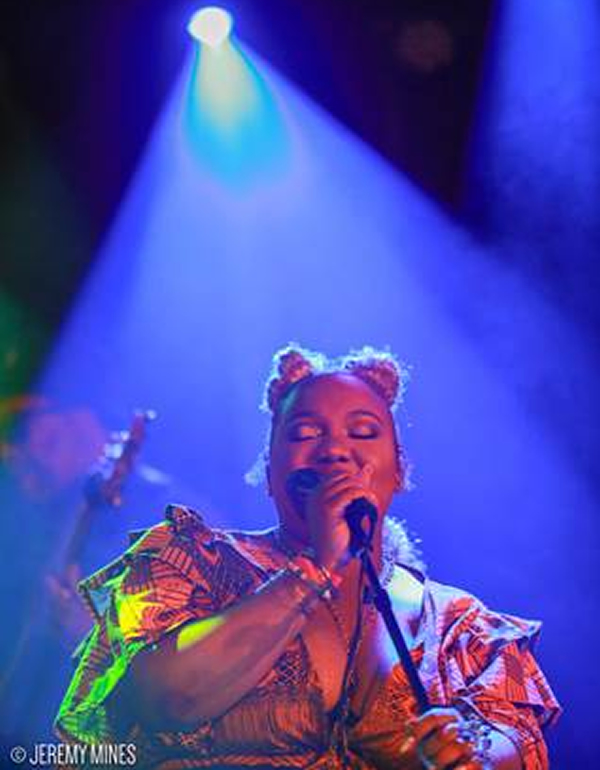
Name: Jennifer Patience Rowe
Occupation: Artist: primary vocalist, poet and actress.
Passion: My passion is facilitating spiritual experiences in secular spaces. I’m passionate about black folks being free. I’m passionate about honoring our grief.
What advice would you give to a young woman walking in your shoes? I would tell young black women that it’s OK to be unsure, its normal to constantly be discovering who you are. That change is the only constant.
Washington is one of the few major cities in America with a female mayor. What does this mean to you as a queer woman living in the District? As a second generation native Washingtonian, it’s beautiful to have experienced all of the changes this city has and is surviving. Having a woman elected mayor has spoken to the great shifts and growth the capital city is capable of seeing.
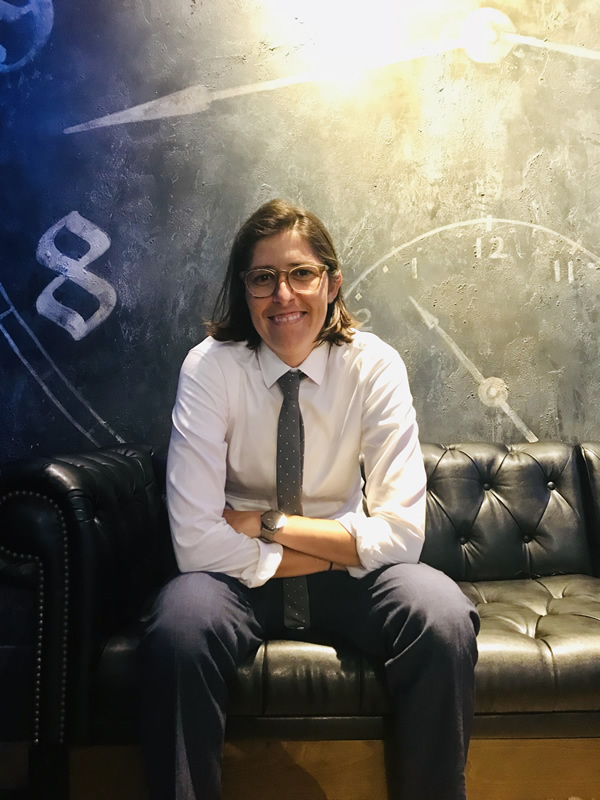
Name: Kristin Lynch
Occupation: Communications director, U.S. Senator Cory Booker (D-NJ)
Passion: Politics, writing, news, sports, avocados, coffee porters
What advice would you give to a young woman walking in your shoes? TDon’t be afraid to defy convention or take the road less traveled – being weird is a good thing. Work hard, be humble, and practice gratitude.
Washington is one of the few major cities in America with a female mayor. What does this mean to you as a queer woman living in the District? Representation matters. When leaders who look differently than what society typically associates with power — i.e. women, people of color, queer individuals — we begin to dismantle our preconceived notions of what a leader should be and reimagine what a leader could be. Having a mayor who is both a woman and a person of color breaks down barriers and shows underrepresented groups that we too can rise to powerful leadership positions, even if we may not always see that truth reflected in our day-to-day lives.
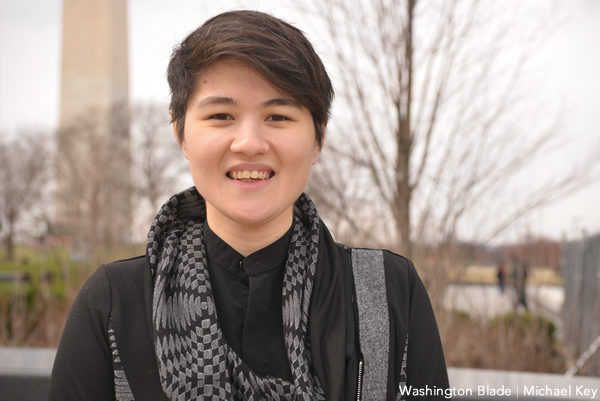
Name: Luella Garies
Occupation: Massage therapist, dance organizer
Passion: A combination of love for partner dancing and of bringing that love to queer women and trans people.
What advice would you give to a young woman walking in your shoes? As a dancer, know that simply by being openly yourself in the very heteronormative world of partner dance, or by breaking gender norms therein, you are a revolutionary. You are changing the world one literal step at a time and that is something to be proud of. As an organizer, someone recently asked me what’s my secret to organizing successful events over the long-term. “Passion,” I said. Actually there are many other answers I could give, but that’s the one I would underscore. You don’t need to be extroverted, popular, talented or wealthy to bring people together. But if you have a dream that lights up your soul and you have an inkling of how to share that with others, you can find a way.
Washington is one of the few major cities in America with a female mayor. What does this mean to you as a queer woman living in the District? To me this is one among many ways that D.C. is setting an example and leading the way for the rest of the country, especially since our mayor is like a governor. It’s all the more reason that we should have full voting rights.
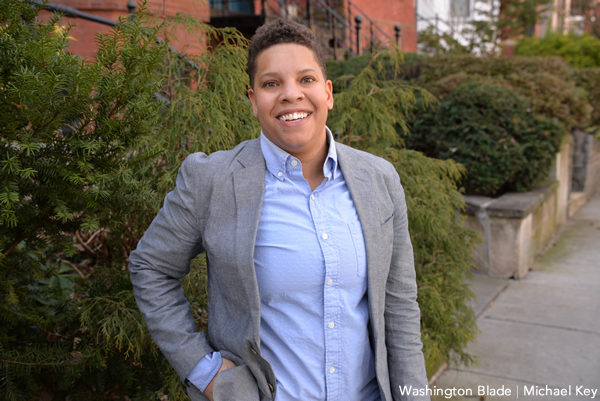
Name: Joy Whitt
Occupation: Presidential Innovation Fellow
Passion: Creating safe, uplifting spaces for women/trans/non-binary folks who are interested in learning about technology.
What advice would you give to a young woman walking in your shoes? Stay true to yourself. Surround yourself with people who will educate and amplify you; pay it forward.
Washington is one of the few major cities in America with a female mayor. What does this mean to you as a queer woman living in the District? As a queer, black woman, it is an incredibly big deal to be a resident of a city led by a black woman. Mayor Bowser represents many of my identities while serving at D.C.’s highest level, and because of that, her initiatives (and council’s policies) create a more inclusive environment for people of color, women, and the LGBTQ community. I lead initiatives in D.C. that create professional and social opportunities for technologists of underrepresented genders (i.e. women, trans and non-binary folks, etc.). Mayor Bowser and the government of D.C. have made these efforts possible by amplifying and celebrating tech inclusion.
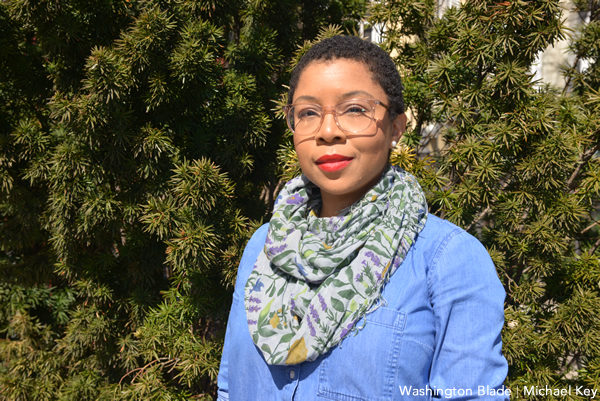
Name: Nicole Armstead-Williams
Occupation: Psychotherapist and mental health advocate
Passion: I’m passionate about dismantling the harmful stigma of mental health, with a particular heartbeat for reducing the risk of suicide and self-harm in QTPOC (queer/trans people of color) communities. I am passionate about creating eco-therapeutic healing spaces for survivors of trauma, loss and grief. I also really get excited about all things rooted in love, wanderlust and long-distance road trips, dogs and growing sweet potatoes.
What advice would you give to a young woman walking in your shoes? To a young woman walking in my shoes, I would say: wear the shoes that are the most authentic fit for you so that you can sustain the walk of your personal dream and journey.
Washington is one of the few major cities in America with a female mayor. What does this mean to you as a queer woman living in the District? Experiencing leadership from not only a woman-identified mayor but a black woman mayor provides me with a greater hope that we as women/women of color can show up, can be seen and affirmed and can support growth as an agent of change. To me, as a queer women living in the District, this means voice and visibility.
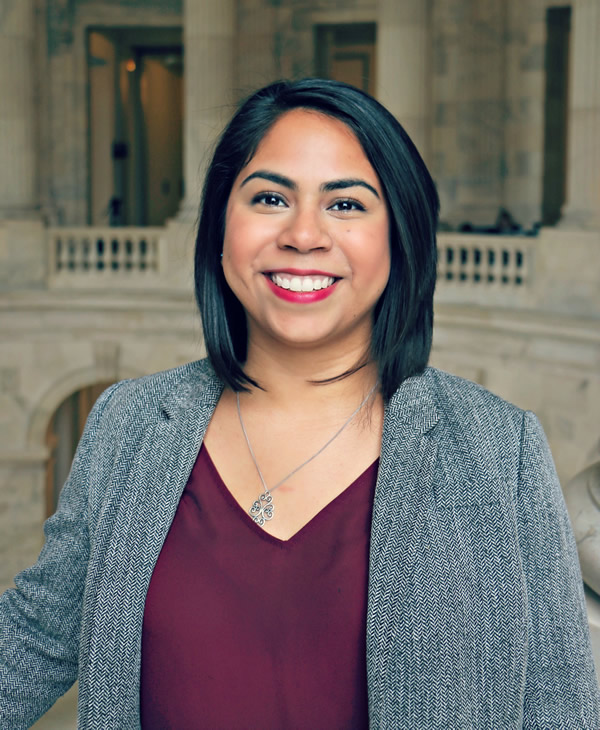
Name: Yesenia Chavez
Occupation: Policy and government affairs specialist
Passion: Developing leadership pipelines of LGBTQ youth and people of color, hiking, traveling and cycling.
What advice would you give to a young woman walking in your shoes? Remember that when you are the only woman of color, the only queer person, or first-generation person in a classroom or a board room, you carry your ancestors into that room with you. Most importantly, once you are in the room, be sure to open the door and pull up a chair for the next generation. When you pull up that chair, be intentional about who you bring to sit there. Start with those who almost never get access to those seats, i.e. trans/gender non-conforming folks, queer people of color, people with disabilities, etc. That is how you make radical change in who gets access to these rooms. We can end being the first or only one in the room if we pull each other up.
Washington is one of the few major cities in America with a female mayor. What does this mean to you as a queer woman living in the District? As a queer Latina, I think it is important to have representation in all levels of government and I value seeing women of color in leadership. I was raised by a Mexican immigrant single-mother in a low-income household and know that is a unique story in comparison to the backgrounds of the voices we typically hear from. I believe it is critical for people who don’t see themselves reflected in leadership, to work to change that because as the saying goes, “If you are not at the table, you are on the menu.” Centering the voices of those of us who are at the intersection of marginalized identities is necessary during the policy-making process to ensure policy has a positive impact on our communities.
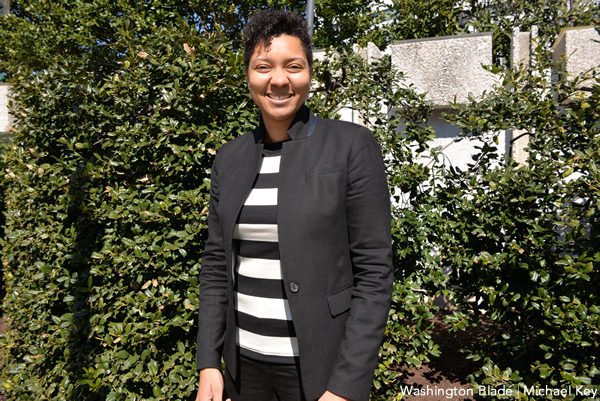
Name: Ashland Johnson
Occupation: Policy lawyer and sports equity advisor
Passion: Creating social equity in and through sports.
What advice would you give to a young woman walking in your shoes? Don’t be afraid to bet on yourself. We as women, especially women of color, invest so much time warding of doubt and working to achieve someone else’s vision of success. You have to make it a priority to invest in you— your goals, your passion, your vision— all day, everyday until it becomes second nature.
Washington is one of the few major cities in America with a female mayor. What does this mean to you as a queer woman living in the District? As a queer woman of color living in D.C., for me having a black female mayor is both an invaluable gift and a necessity. Representation matters. Empowerment matters. Our mayor represents and empowers women, especially women of color everyday she leads our district forward.
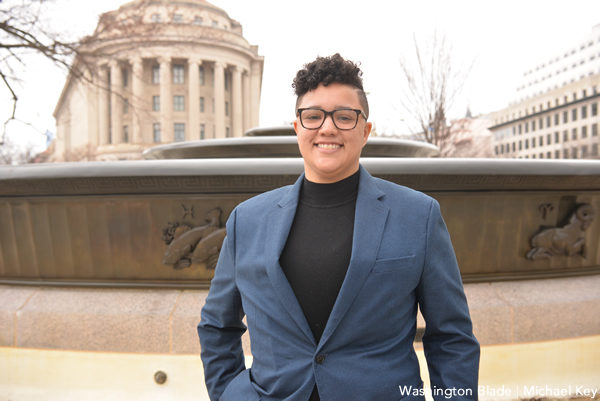
Name: Whitney Washington
Occupation: Attorney/legal fellow
Passion: People are my passion. I love the process of getting to know folks and learning about them. As much as I am willing to get to know absolutely anyone from whatever walk of life, I acknowledge that not all folks are willing to do the same. I understand that to greater society some folks are not worth anything because of who they are or what they may have done in the past. I feel lucky to be able to offer my skill set to show support to the people that society has written off.
What advice would you give to a young woman walking in your shoes? This is a funny question because I still think of myself as a young person. Three things that I remind myself of daily are one: nothing worth doing is easy, but also that the most difficult option is not always the answer — there is often a middle ground; two: I know a lot more than I think I do; and three: I have a lot to learn. Outside of my daily reminders, I think the biggest thing I would tell a younger person is: being a person is a process and that regardless who you are right now, and regardless of whoever you will become, you are valid.
Washington is one of the few major cities in America with a female mayor. What does this mean to you as a queer woman living in the District? The socio-political impact of Muriel Bowser’s position as mayor of Washington cannot be overstated — it is crucial that voices like hers are amplified, especially in our current political climate. As a queer, non-binary individual, this signals to me that this historically black city values its legacy, champions its pioneers and strives to be at the forefront of change in our nation.
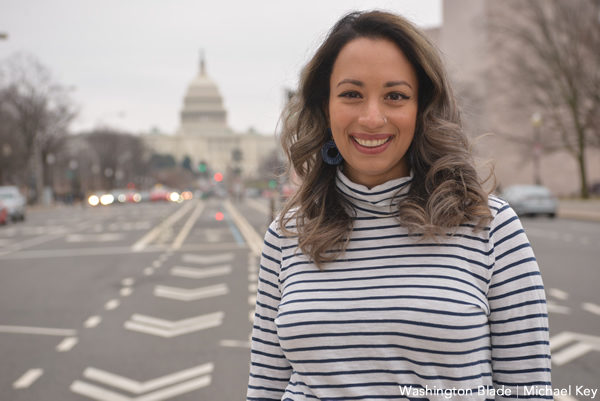
Name: Sarah Horvitz
Occupation: National political director at Run for Something
Passion: Encouraging and supporting young women who want to serve their communities in elected office.
What advice would you give to a young woman walking in your shoes? You aren’t going to be amazing at everything you do on day one. Stay focused on the specific tasks and goals you are trying to accomplish and trust you will get better the more you try. Surround yourself with other women out there who are doing their best and befriend them.
Washington is one of the few major cities in America with a female mayor. What does this mean to you as a queer woman living in the District? I love living in D..C for many reasons (honestly too many to name) but I am especially proud to live in a city with a woman in charge. I know that Mayor Bowser is fighting every day by making political and fiscal decisions that prioritize equity for women and girls, especially people of color and members of the LGBTQ community. She is not only an advocate in our national’s capitol for resident’s of D.C., but is also leading the charge nationally for more representation of marginalized communities in elected office.
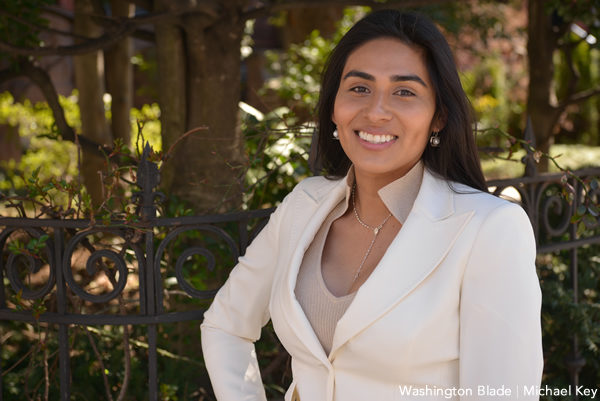
Name: Amber Posadas
Occupation: Specialty support
Passion: Defend the rights of the LGBT community and advocate for those who doesn’t have voice.
What advice would you give to a young woman walking in your shoes? Never give up on your dreams and fight for what you really want in life.
Washington is one of the few major cities in America with a female mayor. What does this mean to you as a queer woman living in the District? It gives me the power to know as a queer woman I too can achieve success.
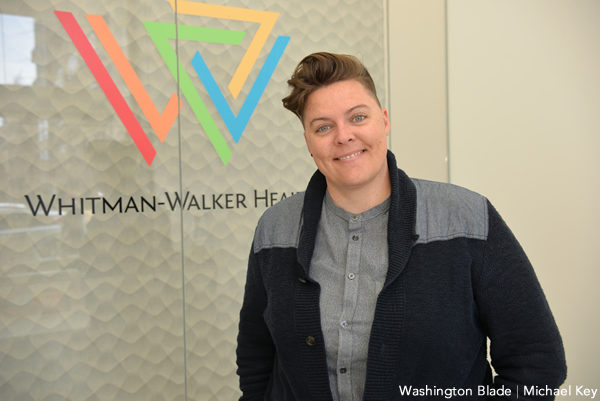
Name: Katie Nicol
Occupation: As senior manager of public benefits and insurance navigation at Whitman-Walker Health, I focus on removing barriers to health care access, particularly for those who identify as LGBTQ, people living with HIV and the immigrant population.
Passion: I’m passionate about helping others, geeking out over insurance eligibility policy and nuance, logistics and the work of Whitman-Walker Health. I have the privilege to be a part of an organization that represents what it means to provide culturally competent care free of stigma and judgement and to serve a patient population I identify with.
What advice would you give to a young woman walking in your shoes? Stay true to your queer self, give yourself room to grow and evolve and don’t take yourself too seriously. Take every opportunity to learn from your experiences, mistakes and from others. Your relationships are your greatest assets — personally and professionally — so nurture those connections. Push yourself outside of your comfort zone and follow your instincts; sometimes your greatest hurdle is fear.
Washington is one of the few major cities in America with a female mayor. What does this mean to you as a queer woman living in the District? In today’s political climate where woman, let alone a woman of color, are marginalized, it’s a reminder that women — regardless if queer or not — are equal to men. It is additionally inspiring to live in a city where a woman of color of color is a true representation of Washingtonians and our values, which include inclusivity for all residents, regardless of immigration, sexual orientation or gender expression.
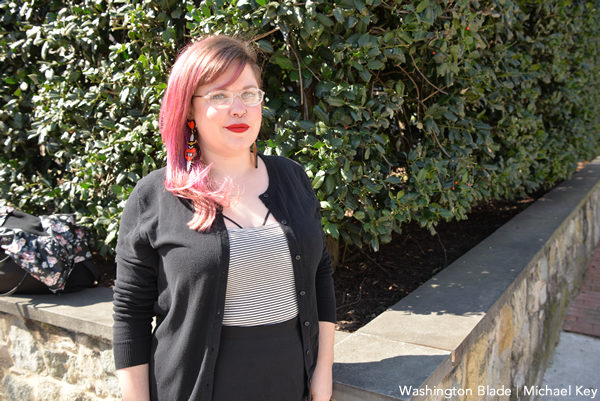
Name: Emily Hammell
Occupation: Events manager for LGBTQ Victory Fund & Institute
Passion: Oh gosh, so many to chose from! My most noteworthy passion is my collection of commemorative plates. But I also love Raquel Raccoon (my three-legged cat), relationship anarchy, tattoos, LGBTQ+ rights, gender and racial equity, sex workers rights and harm reduction.
What advice would you give to a young woman walking in your shoes? Be as out and loud as you’re able to, it matters so much to those who can’t. And if you can’t be out and loud? Please be kind to yourself, you are still part of the queer family and you matter so much.
Washington is one of the few major cities in America with a female mayor. What does this mean to you as a queer woman living in the District? It’s pretty dang inspiring to see a woman of color succeed in the political world. I may not always agree with Mayor Bowser, but I absolutely respect how hard she has worked to climb that ladder.
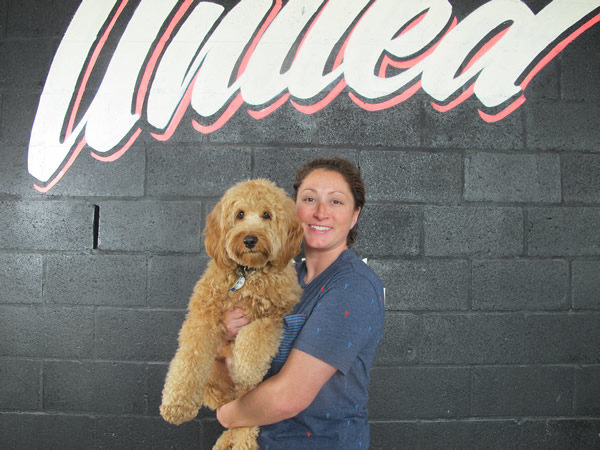
Name: Brittany Rheault
Occupation: Director of sports operations at United Fray
Passion: My passion at work is making fun possible. I have the pleasure of bringing “play” into everyday life with my job. I couldn’t ask for a better profession. As for the rest of my life, my passion is to make people feel included, whether that’s on a dance floor or with my friends, I’m always striving for laughter and fun and connection.
What advice would you give to a young woman walking in your shoes? Hustle. What separates you from the pack is your willingness to step in or step up. Being complacent is never an option. You have to be willing to show up and impress with commitment and work ethic.
Washington is one of the few major cities in America with a female mayor. What does this mean to you as a queer woman living in the District? To me, it’s inspiring that I am living in a city that would not only elect but reelect a female mayor.
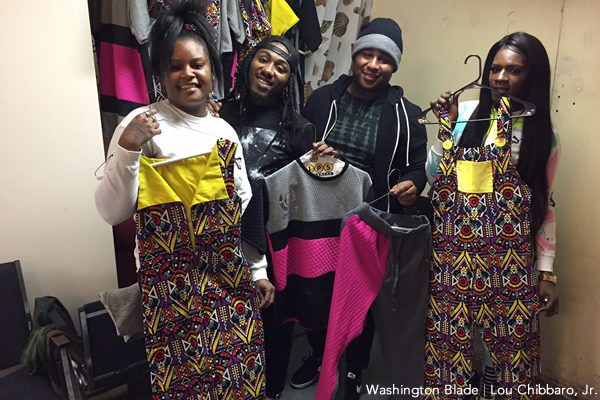
Name: Check It Enterprises; Star Bennett, CEO
Occupation: CEO of Check It Enterprises
Passion: fashion design
What advice would you give to a young woman walking in your shoes? Chase your dreams and never give up.
Washington is one of the few major cities in America with a female mayor. What does this mean to you as a queer woman living in the District? That females have the same ability men have.
a&e features
Transmission DC breathes new life into a storied sound space
A fresh home for boundary-pushing culture on H Street

Late last year, phoenix-style, a fresh home for boundary-pushing culture arose on the H Street corridor. Transmission DC – a queer, trans, and POC-owned, operated, and centered community-focused venue – powered on in the former home to the Rock & Roll Hotel (famously, not a hotel, but very much rock & roll). Transmission (1353 H St., N.E.) arrives secure in its mandate – or even birthright – to provide a place to celebrate creativity and music through a lens of inclusivity and respect.
Transmission’s team brings experience, but also representation. Owners/partners Kabir Khanna (who is also programming director), Katii B, Ellie McDyre, and Kelli Kerrigan together previously managed 618 productions, a venue in Chinatown, crafting “some of D.C.’s freakiest parties, raves, and mosh pits” they note.
They packed up operations last fall to a space curated specifically for D.C.’s underground music and culture scene, building their efforts in Chinatown to bring in more fans in queer and POC circles.
Transmission, Khanna points out, is built on DIY values. In the music scene, DIY means that promoters and organizers – often disconnected from the mainstream and part of marginalized communities – build shows and programs collaboratively, but independently from institutions, supporting each other as smaller, independent venues close. Here, Transmission aims to ensure that those putting together these underground inclusive shows have a more permanent and stable home, can have access to resources, and can provide more sustainable income to artists. “We’re trying to get more people to support and enjoy the music, and also give artists and organizers within the DIY community more structure and a larger cut,” says Khanna.
Khanna also notes that Transmission operates “under the principles of safety, inclusivity, and respect.” McDyre added that even at venues that claim inclusivity, that statement might not take place in practice. We’re “not just pitting up a rainbow flag,” says McDyre, but as some of the owners are trans and POC, audiences can see themselves reflected at the top.
Much like the DIY nature of the music community, the Transmission owners brought a DIY ethos to turning around their space.
In March 2020 – the height of COVID lockdowns – Rock & Roll Hotel suddenly shuttered, though not due to the pandemic; instead, the venue claimed that decreasing sales and increasing competition led to the closure. For 14 years, it was the central spot for cheap beer and lesser-known and celebrated acts. The space stood vacant for more than five years, until Transmission turned the power back on.
“When we got into the space, it was effectively abandoned for years,” says Khanna. “There was a ton of mold, and paint primer covering all surfaces. It was nearly falling apart.” Khanna noted that many music venues like this one, regardless of how well it was maintained, “get the shit kicked out of it,” given the nature of shows. The team called in mold removal contractors, ripped up most of the floorboards, and started fresh.
Transmission’s first floor is styled as a stripped-down black box: the better to take in the music. “It’s minimal on purpose to act as a canvas for set design and music,” without a specific aesthetic, says Khanna. Moving upstairs, the second floor has been opened up, removing some walls, and now has a larger dance area than the first floor. Beyond the first two performance levels, and a holdover from Rock & Roll Hotel, is the rooftop. Though without a stage, the rooftop space is filled with murals splashed across the walls, with a full bar. Transmission’s current capacity is 496, but the team is looking to grow that number. Transmission will also leverage the full kitchen that Rock & Roll Hotel operated, bringing in Third Hand Kitchen to offer a variety of food, including vegan and vegetarian options.
Khanna pointed out an upcoming show reflective of Transmission’s inclusive ethos: Black Techo Matters on Feb. 27. The event is set to be “a dynamic, collaborative night of underground electronic music celebrating Black History Month.” Khanna says that techno came from Black music origins, and this event will celebrate this genesis with a host of artists, including DJ Stingray 313, Carlos Souffront, and Femanyst.
a&e features
Meet D.C.’s Most Eligible Queer Singles
Our annual report, just in time for Valentine’s Day

Just in time for Valentine’s Day, the Blade is happy to present our annual Most Eligible Singles issue. The Singles were chosen by you, our readers, in an online nominations process.
John Marsh

Age: 35
Occupation: DJ and Drag Entertainer
How do you identify? Male
What are you looking for in a mate? I’m looking for someone who’s ready to dive into life’s adventures with me. someone independent and building their own successes, but equally open to supporting each other’s dreams along the way. I know that probably sounds simple because, honestly, who isn’t looking for that? But my life and career keep me very social and busy, so it’s important to me to build trust with someone who understands that. I want a partner who knows that even when life gets hectic or I’m getting a lot of attention through my work in the community, it doesn’t take away from my desire to build something real, intentional, and meaningful with the right person.
Biggest turn off: My biggest turnoff is arrogance or judgment toward others. I’m most drawn to people who are comfortable being themselves and who treat everyone with the same level of respect and care. I’ve worked hard for the success I’ve found, but I believe in staying humble and leading with kindness, and I’m attracted to people who live the same way. I’m also turned off by exclusionary mindsets, especially the idea that sapphic folks don’t belong in gay spaces. Our community is vibrant, diverse, and strongest when it’s shared with everyone who shows up with respect and love
Biggest turn on: I’m drawn to people who can confidently walk into new spaces and create connection. Being able to read a room and make others feel comfortable shows emotional intelligence and empathy, which I find incredibly attractive. I also come from a very social, open, and welcoming family environment, so being with someone who embraces community and enjoys bringing people together is really important to me.
Hobbies: I have a lot of hobbies and love staying creative and curious. I’m a great cook, so you’ll never have to worry about going hungry around me. In my downtime, I watch a lot of anime and I will absolutely talk your ear off about my favorites if you let me. I’m also a huge music fan and K-pop lover (listen to XG!), and I’m a musician who plays the cello. I spend a lot of time sewing as well, which is a big part of my creative expression. My hobbies can be a little all over the place, but I just genuinely love learning new skills and trying new things whenever I can.
What is your biggest goal for 2026? This year feels like a huge milestone for me. I’m getting ready to join a tour this summer and want to represent myself well while building meaningful connections in every city I perform in. I’m also focused on growing as a DJ, sharing more mixes and content online, and reaching a big creative goal of releasing original music that I’m producing.
Pets, Kids or Neither? I have a lovely Akita named Grady that I’ve had for 10 years and always want pets in my life. I’m open to kids when/if the time is right with the right person.
Would you date someone whose political views differ from yours? Hell no. I don’t see political differences as just policy disagreements anymore – they often reflect deeper values about how we treat people and support our communities. I’m very progressive in my beliefs, and I’m looking for a partner who shares that mindset. For me, alignment in values like equity, compassion, and social responsibility is non-negotiable in a relationship. To be very clear about my beliefs, I’m outspoken about my opposition to immigration enforcement systems like ICE and believe both political parties have contributed to policies that have caused real harm to vulnerable communities. I’m also deeply disturbed by the ongoing violence in Palestine and believe we need to seriously examine our support of military actions that have resulted in the loss of countless innocent lives. These aren’t abstract political opinions for me, they are moral issues that directly inform who I am and what I stand for.
Celebrity crush: Cocona
Name one obscure fact about yourself: I used to own a catering business in college that paid for my school — I also went to a Christian college, lol.
Jackie Zais

Age: 35
Occupation: Senior director at nonprofit
How do you identify? Lesbian woman
What are you looking for in a mate? Looking for someone who’s curious about the world and the people in it — the kind of person who’s down to explore a new spot one night and stay in with takeout the next. Confident in who they are, social without being exhausting, adventurous but grounded, thoughtful but not pretentious. Someone who can be funny while still taking life (and relationships) seriously.
Biggest turn off: Doesn’t have strong opinions. I love hearing a wild hot take.
Biggest turn on: When someone can make me belly laugh.
Hobbies: Number one will always be yapping with friends over food, but I also love collecting new hobbies. Currently, I crochet (and have some dapper sweater vests as a result), listen to audiobooks on what I personally think is a normal speed (2x) and play soccer and pickleball. But I’ve tried embroidery, papier-mâché, collaging, collecting plants, scrap booking, and mosaic.
What is your biggest goal for 2026? I’ve recently started swimming and I want to look less like a flailing fish and more like someone who knows what they’re doing.
Pets, Kids or Neither? I have neither but open to kids
Would you date someone whose political views differ from yours? My best friend is a moderate Democrat and that’s as far right as I’m willing to go.
Celebrity crush: Tobin Heath
Name one obscure fact about yourself: I’m the daughter of Little Miss North Quincy 1967.
Kevin Schultz

Age: 39
Occupation: Product manager
How do you identify? Gay
What are you looking for in a mate? You know 2001’s hottest Janet Jackson single, “Someone to Call My Lover?” To quote Janet, “Maybe, we’ll meet at a bar, He’ll drive a funky car; Maybe, we’ll meet at a club, And fall so deeply in love.”
Realistically though, I’d love to find someone who loves to walk everywhere and who avoids the club because it’s too loud and crowded. Later in the song, our songstress opines “My, my, looking for a guy, guy, I don’t want him too shy; But he’s gotta have the qualities, That I like in a man: Strong, smart, affectionate” and I’m quite aligned there – I’m an introvert looking for someone more extroverted.
I’m looking for someone who is different from me. When the math works, one plus one should equal two. Two becoming one is more art, and my relational approach is more science, or, I guess, math.
Biggest turn off: I’m turned off by a lot of superficially small things — chewing with one’s mouth open, dirty or untrimmed fingernails, oh, and also, lack of self awareness. My personal brand of anxiety is hyper self-aware, so I’m very turned off by someone who doesn’t realize that they exist in the world with others.
Biggest turn on: Competency. Or maybe…eyes? So perhaps, you see my conundrum — I’m very engaged by people who are deeply engaged by something, but I’d be lying if I said a sharp gaze and a wink didn’t get me. And, you know, some stamina in all avenues, mental and physical doesn’t hurt either.
Hobbies: Fixing everyone’s WiFi (this did actually get me a date once), and just generally fixing everyone’s everything. If it’s got a plug, screen, or buttons I can probably help you with it. On my own, I’m really into smart home devices and automation, and just to be timely, my latest thing is setting up and tuning my own instance of OpenClaw. (No one should actually do this, which is why I’m trying.) Together, we could also explore such hobbies as visiting every Metro station, visiting and exploring a new airport, and exploring why there are so many gay transit nerds. There’s no non-fake sounding way to say this but I also just love knowledge seeking, so I’d also love to go on an adventure with you where we learn something brand new.
What is your biggest goal for 2026? My biggest goal is to arrive to 2027 just a little better than I arrived to 2026. A few gym goals, a few personal goals, a few work goals; I hope to get a few of them across the finish line. At the risk of holding myself accountable, one of those goals is to be able to flawlessly side plank for over a minute. Please don’t mistake me for a huge gym rat; I just have a questionable relationship with balance and I’m really working on it.
Pets, Kids or Neither? I’ll just be blunt: no pets. Stating this on my Hinge profile resulted in an exponential loss of matches, so it’s very fun to trot out the idea. Primarily, I’m allergic to cats and dogs so my aversion is mostly biological. I’m not, however, allergic to kids — big fan of my various nieces and nephews — but I’d really only consider kids of my own if my chosen companion and I could financially afford them without compromise, and at this age I’ve become opinionated about the life I want to live.
Would you date someone whose political views differ from yours? No. This becomes a simpler answer with each passing day, unfortunately.
Celebrity crush: If I’m being of the moment, of course, it’s going to be one of the gentlemen on “Heated Rivalry,” but if I were to really dig into the archives it would be pre-Star Trek Chris Pine. I first saw him in an absolute train wreck of a movie called “Blind Dating” where he plays a blind guy who tries to pretend to be sighted in order to date. The movie was terrible, but I found him irresistible.
Name one obscure fact about yourself: I went suddenly deaf on one side only (my left) just before my 33rd birthday. After a bit of time in the wilderness (metaphorically) I got a cochlear implant a few years later, and it really changed my life. I will talk until someone stops me about hearing, sound, and the amazing arena of hearing loss technology. A lot of people, when they see my implant, assume I was born with hearing loss, so it’s always a bit odd (obscure even!) when I tell people I lost it as an adult. But, I also got my hearing back as an adult and am an eager advocate for assistive technology and visibility for people with disabilities that are not always immediately visible. I also work with prospective adult implant candidates to determine if an implant is right for them, because losing hearing suddenly as an adult is isolating and it’s helpful to talk to someone who’s been there.
Gabriel Acevero

Age: 35
Occupation: Maryland State Delegate
How do you identify? Gay
What are you looking for in a mate? Emotional intelligence and a sense of humor.
Biggest turn off: Fetishization.
Biggest turn on: Kindness and emotional intelligence.
Hobbies: Traveling and reading (I love books).
What is your biggest goal for 2026? More self care. I love what I do but it can also be physically taxing. In 2026, I’m prioritizing more self care.
Pets, Kids or Neither? I have neither but I’m open to both.
Would you date someone whose political views differ from yours? No.
Celebrity crush: Kofi Siriboe
Name one obscure fact about yourself: I’m a Scorpio who was raised by a Scorpio and I have many Scorpios in my life.
Vida Rangel

Age: 36
Occupation: Public Servant, Community Organizer
How do you identify? I am a queer transLatina
What are you looking for in a mate? I’m looking for a partner who is caring, socially aware, and passionate about meaningfully improving some part of this world we all live in. Ideally someone playful who can match my mischievous energy, will sing and dance with me whenever joy finds us, and will meet me at protests and community meetings when the moment calls for bold collective action.
Biggest turn off: Ego. Confidence can be cute, but humility is sexy.
Biggest turn on: Drive. Seeing someone put their heart into pursuing their goals is captivating. Let’s chase our dreams together!
Hobbies: Music in all its forms (karaoke, playing guitar, concerts, musicals…), finding reasons to travel to new places, and making (Mexican) tamales for friends and coworkers.
What is your biggest goal for 2026? My biggest goal for 2026 is to organize and a celebratory kiss on election night wouldn’t hurt.
Pets, Kids or Neither? An adorable black cat named Rio (short for Misterio)
Would you date someone whose political views differ from yours? Ma’am? If you feel the need to ask…
Celebrity crush: Mi amor, Benito Bad Bunny. Zohran Mamdani, too. I have lots of love to give.
Name one obscure fact about yourself: I worked at Chick-fil-A when I was in high school and was fired after just three months. At the time it was still legal to fire someone for being trans, but I’m pretty sure it was because I called out to go to a Halloween party.
Em Moses

Age: 34
Occupation: Publishing
How do you identify? Queer
What are you looking for in a mate? Companionship, passion, fun. I seek a confident partner who inspires me, someone to laugh and dance with, someone with a rich internal universe of interests and experiences to build upon. A lifelong friend.
Biggest turn off: Dishonesty.
Biggest turn on: I love when someone is exactly themselves, nurturing their passions and skills and showing up uniquely in this world as only they can.
Hobbies: I love to read. I create art with my hands. When the weather is nice I’m outside, walking around the District looking at flowers and trees.
What is your biggest goal for 2026? My main goal this year is to spend more time with my nieces and nephews.
Pets, Kids or Neither? No pets or children in my life currently.
Would you date someone whose political views differ from yours? While I consider myself quite openminded and genuinely enjoy learning from perspectives different from my own, I have clear boundaries around my morals and those pillars do not fall.
Celebrity crush: Luigi Mangione
Name one obscure fact about yourself: My first job was at a donut shop.
Nate Wong

Age: 41
Occupation: Strategy adviser to nonprofits and philanthropists to help ambitious ideas turn into meaningful, positive societal impact.
How do you identify? Gay (he/him)
What are you looking for in a mate? An additive partner: sociable, adventurous, and curious about the world. I’m drawn to warmth, openness, and people who show up fully — one-on-one and in community. If you enjoy a good dinner party, make eye contact, and actually talk to strangers (I know a D.C. no-no), we’ll get along just fine.
Biggest turn off: Not being present. Active listening matters to me; attention is a form of respect (and honestly, very attractive). And a picky food eater (how will we some day be joint food-critics?).
Biggest turn on: Curiosity, adventuresome spirit, and someone who can hold their own in a room — and still make others feel at ease. Confidence is best when it’s generous.
Hobbies: Splitting my time between the ceramics studio (District Clay), planning the next trip, and finding great food spots. I box to balance it all out, and I love curating small, adventurous gatherings that bring interesting people together — the kind where you stay later than planned.
What is your biggest goal for 2026? The last few years threw some curve balls. So 2026 is all about moving forward more freely and passionately, trusting what feels right and following it with intention (and joy).
Pets, Kids or Neither? Open to kids (in a variety of forms — already have some adorable god kids). A hypoallergenic dog would absolutely raise the cuddle quotient; cats are best admired from a respectful, allergy-safe distance.
Would you date someone whose political views differ from yours? I value thoughtful listening and sincere debate; shared values around the honoring of everyone’s humanity, equity, and justice matter to me and aren’t up for debate.
Celebrity crush: Bad Bunny style with Jason Momoa humble confidence (harking to my Hawaiian roots) and Idris Elba charm — range matters.
Name one obscure fact about yourself: I celebrated medical clearance by going surfing in El Salvador. I’ve also nearly been arrested in Mozambique and somehow walked away unscathed (and without complying with a bribe) — happy to explain over an excursion.
Diane D’Costa

Age: 29
Occupation: Artist + Designer
How do you identify? Queer/lesbian
What are you looking for in a mate? A cuddle buddy, a fellow jet setter, a muse! Someone to light my soul on fire (in a good way).
Biggest turn off: Apathy. I care deeply about a lot of things and need someone with a similar curiosity and zest for life.
Biggest turn on: Mutuality really does it for me — a push and pull, someone who will throw it back and also catch it. I love someone who takes initiative, shows care and compassion, and expresses fluidity and confidence.
Hobbies: You can find me throwing pottery, painting, sipping natural wine, supporting local coffee shops, and most definitely tearing up a QTBIPOC dance floor.
What is your biggest goal for 2026? Producing my first solo art show. This year I’m really leaning into actualizing all my visions and dreams and putting them out into the world.
Pets, Kids or Neither? I’ve got a Black Lab named Lennox after the one and only D.C. icon, Ari Lennox. I love supporting the youth and (made a career out of it), but don’t necessarily need to have little ones of my own.
Would you date someone whose political views differ from yours? No. Values alignment is key, but if you wanna get into the nuances of how we actualize collective liberation let’s get into it.
Celebrity crush: Queen Latifah
Name one obscure fact about yourself: I’m in the “Renaissance” movie. I know, I know slight flex… but “Crazy In Love” bottom left corner for a split second and a harsh crop, but I’m in there. “You are the visuals, baby” really hit home for me.
Donna Marie Alexander

Age: 67
Occupation: Social Worker
How do you identify? Lesbian
What are you looking for in a mate? Looking for a smart, kind, emotionally grown woman who knows who she is and is ready for real companionship. Also, great discernment and a good lesbian processor. Bonus points if you’ll watch a game with me— or at least cheer when I do. Extra bonus if you already know that women’s sports matter.
Ideal first date: Out for tea or a Lemon Drop that turns into dinner, great conversation, and a few laughs. Low drama, high warmth.
Must haves: A sense of humor, curiosity about the self, curiosity about me, and curiosity about the world. An independence, and an appreciation for loyalty—on and off the field. Dealbreaker: Anyone who thinks “it’s just a game.”
Biggest turn off: Self-centered and a lack of discernment.
Biggest turn on: Great conversation and a sense of humor.
Hobbies: Watching the Commanders game
What is your biggest goal for 2026? Self-growth and meeting an amazing friend.
Pets, Kids or Neither? I have two kids and grandkids.
Would you date someone whose political views differ from yours? No
Celebrity crush: Pam Grier
Name one obscure fact about yourself: She’s way more superstitious about game-day routines than she lets on
Joe Reberkenny

Age: 24
Occupation: Journalist
How do you identify? Gay
What are you looking for in a mate? Someone who’s driven, flexible, and independent. I’m a full-time journalist so if there’s news happening, I’ve gotta be ready to cover breaking stories. I’m looking for someone who also has drive in their respective career and is always looking to the future. I need someone who gets along with my friends. My friends and community here are so important to me and I’m looking for someone who can join me in my adventures and enjoys social situations.
Biggest turn off: Insecurity and cocky men. Guys who can’t kiki with the girls. Early bedtimes.
Biggest turn on: Traits: Emotional stability and reliability. A certain sense of safety and trust. Someone organized and open to trying new things. Physical: Taller than I am (not hard to do at 5’7″) but also a preference for hairy men (lol). Someone who can cook (I am a vegetarian/occasional pescatarian and while it’s not a requirement for me in a partner it would need to be something they can accommodate).
Hobbies: Exploring D.C. — from museums to nightlife, reading (particularly interested in queer history), dancing, frolicking, playing bartender, listening to music (preferably pop), classic movie connoisseur (TCM all the way).
What is your biggest goal for 2026? Continue my work covering LGBTQ issues related to the federal government, uplift queer voices, see mother monster (Lady Gaga) in concert.
Pets, Kids or Neither? I’ve got neither but I love a pet.
Would you date someone whose political views differ from yours? No
Celebrity crush: Pedro Pascal
Name one obscure fact about yourself: I’ve been hit by multiple cars and I have a twin sister.
a&e features
Marc Shaiman reflects on musical success stories
In new memoir, Broadway composer talks ‘Fidler,’ ‘Wiz,’ and stalking Bette Midler

If you haven’t heard the name Marc Shaiman, you’ve most likely heard his music or lyrics in one of your favorite Broadway shows or movies released in the past 50 years. From composing the Broadway scores for Hairspray and Catch Me if You Can to most recently working on Only Murders in the Building, Hocus Pocus 2, and Mary Poppins Returns, the openly queer artist has had a versatile career — one that keeps him just an Oscar away from EGOT status.
The one thing the award-winning composer, lyricist, and writer credits with launching his successful career? Showing up, time and time again. Eventually, he lucked out in finding himself at the right place at the right time, meeting industry figures like Rob Reiner, Billy Crystal, and Bette Midler, who were immediately impressed with his musical instincts on the piano.
“Put my picture under the dictionary definition for being in the right place at the right time,” Shaiman says. “What I often try to say to students is, ‘Show up. Say yes to everything.’ Because you never know who is in the back of the theater that you had no idea was going to be there. Or even when you audition and don’t get the part. My book is an endless example of dreams coming true, and a lot of these came true just because I showed up. I raised my hand. I had the chutzpah!”
Recalling one example from his memoir, titled Never Mind the Happy: Showbiz Stories from a Sore Winner ( just hit bookshelves on Jan. 27), Shaiman says he heard Midler was only hiring Los Angeles-based artists for her world tour. At the young age of 20, the New York-based Shaiman took a chance and bought the cheapest flight he could find from JFK. Once landing in L.A., he called up Midler and simply asked: “Where’s rehearsal?”
“Would I do that nowadays? I don’t know,” Shaiman admits. “But when you’re young and you’re fearless … I was just obsessed, I guess you could say. Maybe I was a stalker! Luckily, I was a stalker who had the goods to be able to co-create with her and live up to my wanting to be around.”
On the occasion of Never Mind the Happy’s official release, the Bladehad the opportunity to chat with Shaiman about his decades-spanning career. He recalls the sexual freedom of his community theater days, the first time he heard someone gleefully yell profanities during a late screening of The Rocky Horror Picture Show, and why the late Rob Reiner was instrumental to both his career and his lasting marriage to Louis Mirabal. This interview has been edited and condensed.
BLADE: Naturally, a good place to start would be your book, “Never Mind the Happy.” What prompted you to want to tell the story of your life at this point in your career?
SHAIMAN: I had a couple of years where, if there was an anniversary of a movie or a Broadway show I co-created, I’d write about it online. People were always saying to me, “Oh my God, you should write a book!” But I see them say that to everybody. Someone says, “Oh, today my kitten knocked over the tea kettle.” “You should write a book with these hysterical stories.” So I just took it with a grain of salt when people would say that to me. But then I was listening to Julia Louis-Dreyfus’ podcast, and Jane Fonda was on talking about her memoir — not that I’m comparing myself to a career like Jane Fonda’s — but she felt it was time to take a life review. That really stuck in my head. At the time, I was sulking or moping about something that had not gone as well as I wished. And I guess I kind of thought, “Let me look back at all these things that I have done.” Because I have done a lot. I’m just weeks short of my 50th year in show business, despite how youthful I look! I just sat down and started writing before anyone asked, as far as an actual publisher.
I started writing as a way to try to remind myself of the joyous, wonderful things that have happened, and for me not to always be so caught up on what didn’t go right. I’ve been telling some of these stories over the years, and it was really fun to sit down and not just be at a dinner party telling a story. There’s something about the written word and really figuring out the best way to tell the story and how to get across a certain person’s voice. I really enjoyed the writing. It was the editing that was the hard part!
BLADE: You recall experiences that made you fall in love with the world of theater and music, from the days you would skip class to go see a show or work in regional productions. What was it like returning to those early memories?
SHAIMAN: Wonderful. My few years of doing community theater included productions that were all kids, and many productions with adults, where I was this freaky little 12-year-old who could play show business piano beyond my years. It was just bizarre! Every time a director would introduce me to another cast of adults, they’d be like, “Are you kidding?” I’d go to the piano, and I would sightread the overture to Funny Girl, and everybody said, “Oh, OK!” Those were just joyous, wonderful years, making the kind of friends that are literally still my friends. You’re discovering musical theatre, you’re discovering new friends who have the same likes and dreams, and discovering sex. Oh my god! I lost my virginity at the opening night of Jesus Christ Superstar, so I’m all for community theater!
BLADE: What do you recall from your early experiences watching Broadway shows? Did that open everything up for you?
SHAIMAN: I don’t remember seeing Fiddler on the Roof when I was a kid, but I remember being really enthralled with this one woman’s picture in the souvenir folio — the smile on her face as she’s looking up in the pictures or looking to her father for approval. I always remember zooming in on her and being fascinated by this woman’s face: turns out it was Bette Midler. So my love for Bette Midler began even before I heard her solo records.
Pippin and The Wiz were the first Broadway musicals I saw as a young teenager who had started working in community theater and really wanted to be a part of it. I still remember Pippin with Ben Vereen and all those hands. At the time, I thought getting a seat in the front row was really cool — I’ve learned since that it only hurts your neck, but I remember sitting in the front row at The Wiz as Stephanie Mills sang Home. Oh my god, I can still see it right now. And then I saw Bette Midler in concert, finally, after idolizing her and being a crazed fan who did nothing but listen to her records, dreaming that someday I’d get to play for her. And it all came true even before I turned 18 years old. I just happened to be in the right place at the right time, and met one of her backup singers and became their musical director. I was brought to a Bette Midler rehearsal. I still hadn’t even turned 18, she heard me play and said, “Stick around.” And I’ve stuck around close to 55 years! She’s going to interview me in L.A. at the Academy Museum. Would I have ever thought that Bette Midler would say yes to sitting with me, interviewing me about my life and career?
BLADE: That’s amazing. Has she had a chance to read the book yet?
SHAIMAN: She read it. We just talked yesterday, and she wants to ask the right questions at the event. And she even said to me, “Marc, I wasn’t even aware of all that you’ve done.” We’ve been great friends for all these years, but sometimes months or almost years go by where you’re not completely in touch.
-

 Federal Government5 days ago
Federal Government5 days agoTwo very different views of the State of the Union
-

 Virginia5 days ago
Virginia5 days agoVa. activists preparing campaign in support of repealing marriage amendment
-

 Opinions4 days ago
Opinions4 days agoThe global cost of Trump’s foreign aid ideology
-

 Opinions4 days ago
Opinions4 days agoCriteria for supporting a candidate in D.C.

